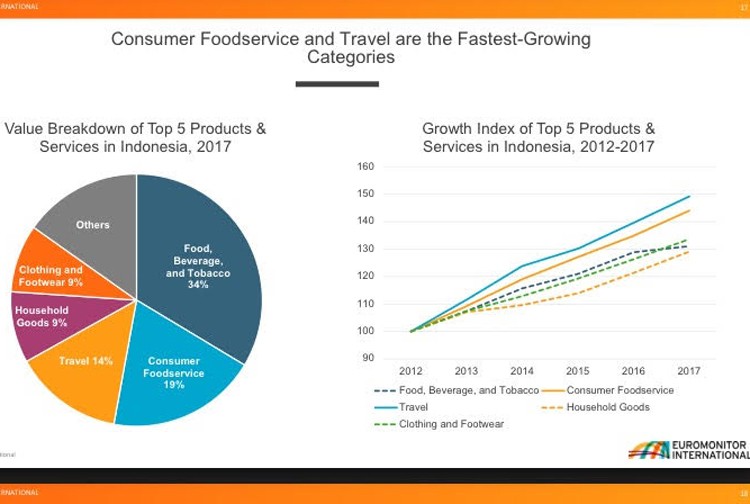Popular Reads
Top Results
Can't find what you're looking for?
View all search resultsPopular Reads
Top Results
Can't find what you're looking for?
View all search resultsIndonesia's consumer confidence up, ranks third in the world
Change text size
Gift Premium Articles
to Anyone
I
ndonesian consumer confidence rebounded in the fourth quarter of last year after having slipped in the previous quarter, according to the latest installment of the 2018 Conference Board Consumer Confidence Survey.
The fourth quarter survey, conducted by Nielsen for the Conference Board, shows that Indonesia scored a consistent 127 points throughout last year, except in the third quarter when its score slipped to 126 points.
The fourth-quarter survey, which was conducted online, ranks Indonesian consumers as the third-most optimistic in the world, preceded only by fellow emerging economies India (133) and the Philippines (131).
In general, consumers in emerging economies tend to be more confident than those of developed economies, according to Nielsen.
Agus Nurudin, managing director of Nielsen Indonesia, told reporters the slip reflects the deterioration of consumer confidence as the rupiah-to-dollar exchange rate gradually fell from Rp 14,300 in July to a record-low Rp 15,200 in October last year.
Consumer confidence then recovered, thanks to the rupiah appreciation and year-end holidays, which greatly stimulated household spending.
Nielsen measured Indonesia’s latest consumer confidence based on how optimistic respondents were about financial security (79 percent), job prospects (68 percent) and increased spending over the next 12 months (63 percent).
Compared to the previous quarter, financial security was unchanged in the fourth quarter, but spending optimism increased by 6 percentage points mainly due to the year-end holidays while job prospects decreased 5 percentage points due to labor market skepticism.
Agus said the skepticism likely came from the fervent political campaigning of Industry 4.0 by the Golkar Party, whose chairman Airlangga Hartarto is also the Industry Minister, and from the slowdown of the manufacturing sector late last year.
“There is a misconception that Industry 4.0 will eliminate jobs. It’s not true, but that is how many workers perceive,” Agus said.
His second point refers to Bank Indonesia’s (UI) Prompt Manufacturing Index (PMI-BI) recording sector growth, which last year slumped from 52.02 percent in the third quarter to 51.92 percent in the fourth quarter.
Nielsen’s finding on employment pessimism contradicts Statistics Indonesia (BPS) data, which said that unemployment reached an all-time record low at 5.3 percent last year.
Agus said the discrepancy between BPS and Nielsen’s data was because the former did not indicate the quality of existing jobs and many respondents were likely disgruntled but employed workers.
“If a man lost his office or factory job to become an online ojek [motorcycle taxi] driver, I don’t think he will be happier even though he’s considered employed,” he said.
Bank Indonesia’s December 2018 Consumer Expectation Survey, which was released recently, supports most of Nielsen’s major findings.
The BI survey shows that consumer confidence last year slipped from 125.2 points to 122.9 points quarter-to-quarter (qtq), before rebounding to 123 by year-end largely due to “aggressive year-end sales promotions”.
However, contrary to Nielsen’s findings, BI’s survey shows that respondents were optimistic over future job availability as optimism increased from 121.2 points to 123.7 points qtq.
"In more granular terms, the two strongest indicators in 2018 were conditions for buying durable goods and future income expectations,” says the survey.
The survey also notes that consumers forecast strong inflation in the January-March period this year due to speculation over fuel price hikes and in the May-June period due to the fasting month and Idul Fitri holidays.










